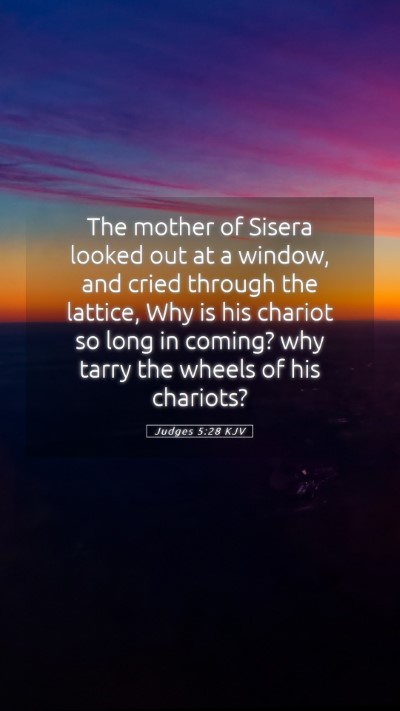Bible Verse Commentary: Judges 5:28
The verse Judges 5:28 states: "The mother of Sisera looked out at a window, and cried through the lattice, Why is his chariot so long in coming? why tarry the wheels of his chariots?" This verse captures a poignant moment in the narrative of Deborah and Barak, focusing on Sisera’s mother as she anxiously awaits the return of her son. Below we summarize insights from renowned public domain commentaries to provide a comprehensive understanding of this verse.
Context and Setting
Judges 5 recounts the Song of Deborah, a poetic celebration of Israel's victory over the Canaanite oppressors, led by Sisera. This particular verse presents the emotional conflict and despair experienced by Sisera’s mother, symbolizing the broader consequences of war and violence.
Insights from Commentary
- Matthew Henry's Commentary:
Henry observes that the mother’s yearning reflects deep sorrow and confusion. He emphasizes how the delay in her son's return highlights the uncertainty of warfare, and she calls into question the reasons for his absence. Henry interprets her lamentation as a representation of defeat and loss, underscoring the human cost of conflict.
- Albert Barnes' Notes:
Barnes points out that her questioning of the delay signifies a mother's hope that her son is victorious. However, the urgency in her plea signifies a foreshadowing of the tragic fate that Sisera has already encountered, illustrating the inevitable turn of events in warfare—where the victors return while the defeated are left unaccounted for.
- Adam Clarke's Commentary:
Clarke elaborates on the symbolism involved in the mother looking through her window, which he suggests may represent the watchfulness and anticipation of parents for the return of their children. Furthermore, he discusses the greater implications of her waiting as a metaphor for those who await the outcome of conflict—often overlooking the harsh realities of warfare.
Thematic Interpretations
This verse encapsulates themes such as the pain of loss, the realities of war, and the wait for return—a universal experience of worry for loved ones in perilous situations.
Additionally, it offers profound insights into the emotional ramifications of battle, where those who remain—like Sisera’s mother—grapple with uncertainty and fear regarding the fate of their warriors.
Application to Daily Life
In modern contexts, this verse encourages readers to reflect on the ramifications of conflict, not only historically but in contemporary society as well. It serves as a reminder of the personal struggles and sacrifices made during times of war, prompting discussions in bible study groups around emotional and ethical dimensions of conflict.
Cross References
- Judges 4:21: This verse illustrates the tragic end of Sisera, providing a counterpoint to the maternal perspective presented in Judges 5:28.
- 2 Samuel 20:3: The mourning for the leaders in Israel after conflict resonates with the mourning expressed by Sisera's mother.
- Psalms 34:18: This verse emphasizes God's closeness to the brokenhearted, echoing the emotional struggle of Sisera's mother.
Conclusion
Judges 5:28 serves as a compelling reminder of the human experiences intertwined with biblical narratives. Understanding this verse through the combined insights from respected commentaries allows readers to grasp the emotional depth, societal implications, and personal applications inherent in this scripture. Exploring such verses helps facilitate bible study insights that can guide both individual reflection and group discussions about the broader themes of loss, waiting, and hope in the Biblical text.


